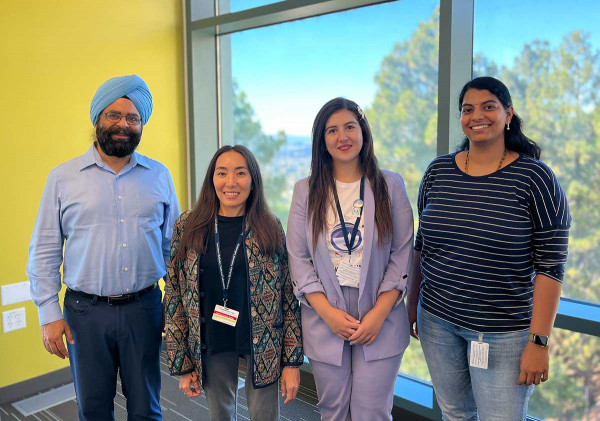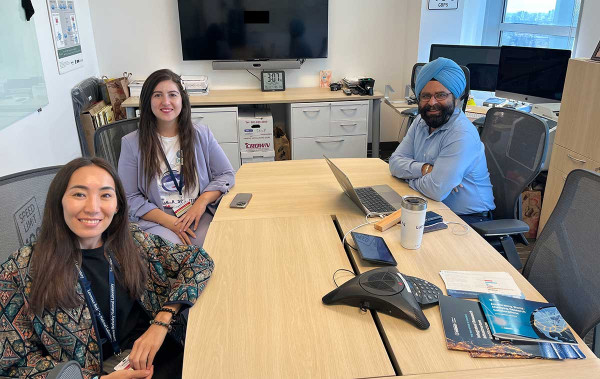Two Emerging Leaders Are Networking for Their Future at ESnet
By Bonnie Powell

ESnet Executive Director Inder Monga, TechWomen Emerging Leaders Zhibek Akasheva and Bouchra Al Halmuni, and Software Engineer Sowmya Balasubramanian.
When Bouchra Al Halmuni, an entrepreneur and software developer in Tetouan, Morocco, opened the email from TechWomen saying she’d been named an “Emerging Leader” and would be going to the United States for the first time, she screamed. “I knew that this is THE chance for me,” she says. “This is what I need to start my NGO.”
Launched in 2011 by the U.S. Department of State, the TechWomen program has brought more than 1,000 Emerging Leaders in science, technology, engineering, and mathematics (STEM) from 22 countries across multiple continents to the United States, traveling together with others from their home country to either the San Francisco Bay Area or Chicago for five weeks of mentorship, knowledge sharing, and network opportunities. For the past decade, Berkeley Lab volunteers in nearly all the research areas have shown 46 of these intrepid women what they do, as well as introducing them to colleagues to share additional expertise.
This year, ESnet Executive Director Inder Monga and Software Engineers Sowmya Balasubramanian and Sukhada Gholba volunteered to mentor two participants. Joining Al Halmuni is Zhibek Akasheva from Almaty, Kazakhstan, who was so excited “to ask all my questions in real life from other professional mentors and guests.”
Building a Network of Mentors
It’s Monga’s second year as a TechWomen mentor, having been inspired to sign up after attending a TechWomen International Day at the Lab and meeting multiple participants. (The next TWIDL is October 17, sponsored by the Molecular Foundry with a focus on science, biotech, and greentech.)
“I was so impressed by these women’s energy and passion for social change,” he explains. “They learned so much and built an amazing network in a short time that they could leverage over the years.” Indeed, ESnet Security Engineer Fatema Bannat Wala, who joined Monga in mentoring the 2022 duo, has stayed in touch — and even participated as a guest speaker in one of their organized conferences, Arabs in Blockchain.
For Balasubramanian, mentoring is a chance to give back. “I firmly believe so many people contribute toward a person’s success,” she says. “There are so many people — starting from my parents, teachers, and so many mentors — who have played key roles in my journey. And now, I want to do the same for others.”
Taking Their Knowledge Home
Al Halmuni has a bachelor’s in electronics from Abdelmalek Essaâdi University, where she says women outnumbered the men: “But after graduation, the women disappear. They get married; they feel like they can’t work in computer science.” Although she is already running two startups, Boxra and The Amazing Women, she wants to use what she’s learned through TechWomen to help her found an NGO focused on empowering these educated women to use their skills and work remotely, building confidence and financial independence.
Akasheva is a researcher turned entrepreneur. She and two cofounders have been working for free on their startup, Smart Heating Network, which has developed a system for transporting hot water securely and cost-effectively. The project leverages Akasheva’s research from her master’s in subterranean energy reservoirs and hydrodynamics-geology-modeling. They’re in talks with the government of a smaller nearby city and are hoping they’ll know this winter if it’s interested in licensing their system.
Both women say that their jam-packed days in the Bay Area have taught them much that will help them in their goals. The TechWomen organization arranged visits to the headquarters of tech giants including Google, LinkedIn, Intel, Autodesk, and others, as well as to smaller companies such as Robust Intelligence. And Balasubramanian and Gholba have set up multiple meetings with ESnet’s diverse array of staff, learning about such topics as managing teams for large projects like ESnet6, processes and practices for Scrum, and the specifics of crafting user experience (UX) journeys.

Akasheva and Al Halmuni chat with Monga in his office.
Seeing Leadership Up Close
As useful as it is to be exposed to UX decision trees and software tools such as Figma, what Al Halmuni and Akasheva are really tucking away for later use is the exposure to American workplace culture and effective leadership. “Moroccan companies are so much more hierarchical,” says Al Halmuni. “You can’t just ask questions. I like how everyone works together here.”
Adds Akasheva, “Every meeting is useful for me, and I have different insights. I am learning about team building, conflict management, project management — real live secrets and advice.
Meeting with Inder, I understood how important it is to create a good atmosphere at work and to build relationships with your colleagues, to learn what motivates a person and help him or her succeed.”
The education has not been one way. “It’s an opportunity for me to learn from talented leaders from different institutes and countries,” says Gholba.
Last year’s mentoring experience was incredibly rewarding. “To see all these young women becoming leaders in STEM not only makes me feel proud but also personally motivates me to become a better version of myself,” explains Bannat Wala. “I believe that we all can become each other's ally, and together with each other's support, we can achieve anything we can dream of. Sometimes just a little support and lending a helping hand go a long way.”

